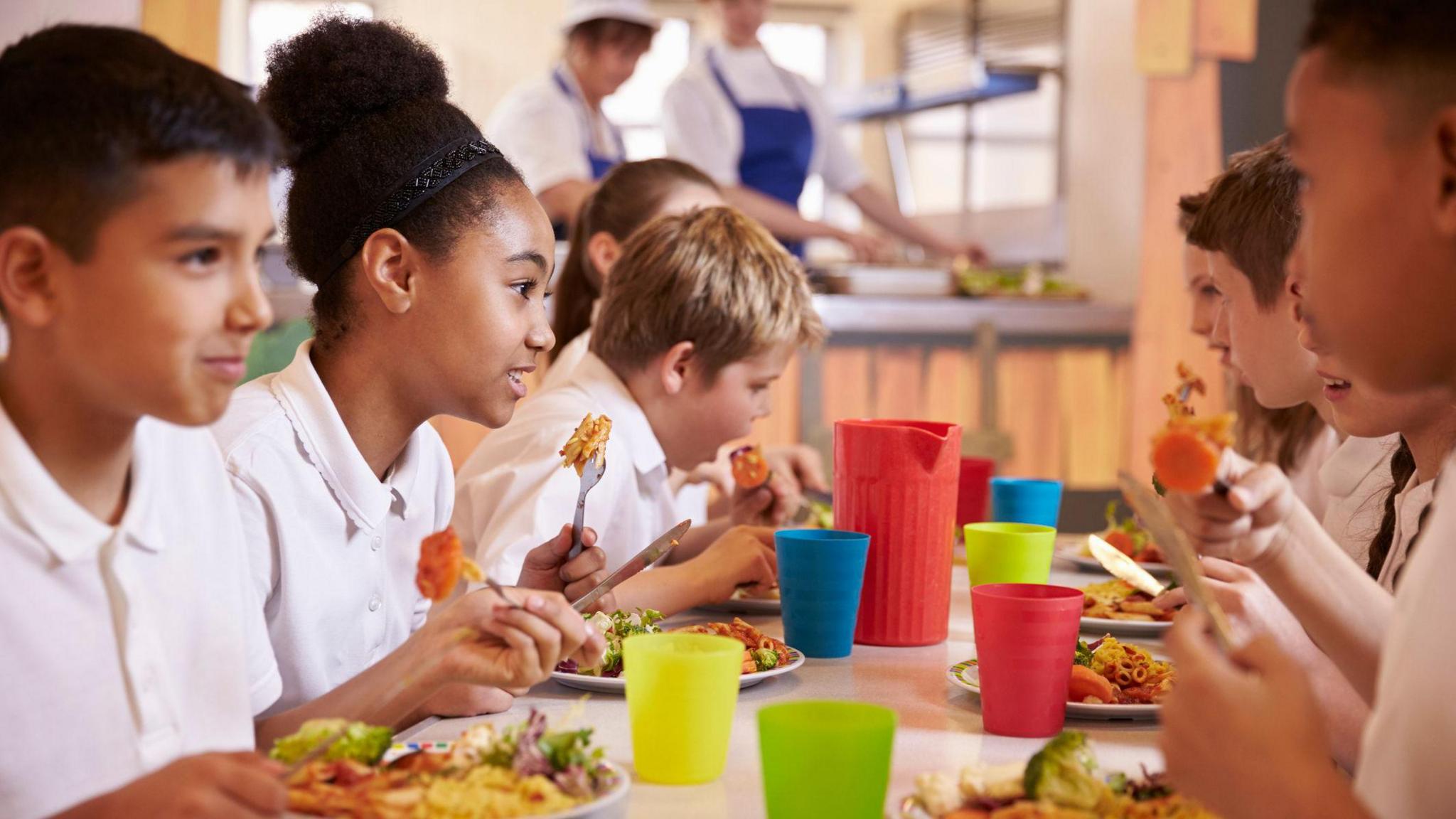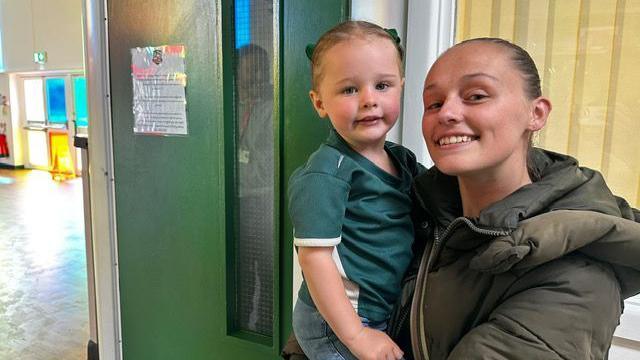Free school meals to be extended to 500,000 more children

- Published
Any child in England whose parents receive Universal Credit will be able to claim free school meals from September 2026, the government has said.
Parents on the credit will be eligible regardless of their income. Currently, their household must earn less than £7,400 a year to qualify.
The government says the change will make 500,000 more pupils eligible, which the prime minister said would "help families who need it most".
Sir Keir Starmer is facing more calls to tackle child poverty by scrapping the two-child benefit cap, but told the BBC that focusing on free school meals would help boost pupil attainment.
Sir Keir Starmer says the expansion of free school meals is a "down payment" on child poverty.
The government said the changes to free school meals would save parents £500 a year and "lift 100,000 children out of poverty".
Sir Keir said the measure was a "down payment" on a broader child poverty strategy, including measures that have already been announced, such as free school breakfast clubs, and those due to be published in this autumn.
Asked by the BBC why he would not first scrap the two-child benefit cap - which prevents most families from claiming means-tested benefits for any third or additional children born after April 2017 - he said "it's really important that we focus on attainment and on the cost of living".
"I'm the first to accept there's no silver bullet, there's no one thing that if you do that there are no other issues," he said. "That's why the [Child Poverty Taskforce] is looking at a broad range of measures."
Education Bridget Phillipson also stressed the plan would lead to higher educational outcomes because "if you're hungry, it's really hard to concentrate".
The Department for Education (DfE) has set aside £1bn to fund the change up to 2029.
In an interview with BBC Radio 4's Today programme, Ms Phillipson declined to say where that money would come from, but said schools would not have to find money for it and that details would be set out in next week's spending review.
She also confirmed to BBC Breakfast that the government was considering scrapping the two-child benefit cap.
The government has also pledged £13m to a dozen food charities across England to "fight food poverty" and said there will be a review of standards so that school meals are healthy.
Ministers considering scrapping two-child benefit cap
- Published27 May
Food bank manager hits out at two-child benefit cap
- Published4 June
Auto-enrol eligible pupils for free school meals, say MPs
- Published28 February
Zayn Malik, the ex-One Direction star, who received free school meals growing up, welcomed the move.
"I'm beyond elated," he wrote in an Instagram story.
Charlotte Evans, 27, from Speke on Merseyside, said her children currently received free school meals.
"With having four kids it does help out quite a bit - not having to worry about what my child is going to eat, if they're going to have enough," she told the BBC.

Charlotte Evans is pleased with the school meals her children receive
Christine Farquharson, associate director of the Institute for Fiscal Studies (IFS), said "other measures - such as lifting the two-child limit - would have a lower cost per child lifted out of poverty".
She said the expansion of free school meals would, in the long term, lead to an additional 1.7 million children getting free lunches and about 100,000 children "lifted out of poverty".
However, she said that would not happen in the "short run" and that "today's announcement will not see anything like 100,000 children lifted out of poverty next year".
The Conservative party has claimed the policy would mean less money for schools' budgets.
Schools receive pupil premium funding for children on free school meals. However, they will not receive that funding for the additional children who receive the meals as a result of the expansion in September 2026.
Neil O'Brien, shadow education minister, called it a "very nasty sting in the tail for school funding" and said the government had "provided no justification at all for this stealth cut".
A DfE spokesman said ministers would "look over the long term at how we allocate it in a better targeted way".

Listen to BBC education editor Branwen Jeffreys' report on BBC Sounds
Kate Anstey, head of education policy at the Child Poverty Action Group, said the extension would cover "all children in poverty and those at risk of poverty", with the current criteria only accounting for around two-thirds of those children.
She said she hoped it was "a sign of what's to come" and the government would take more action.
The Association of School and College Leaders union calling it a "welcome step forward" but adding there was "much more to be done", while the Sutton Trust charity said it was a "significant step towards taking hunger out of the classroom".
Liberal Democrat spokesperson Munira Wilson said the government needed to go further, echoing calls from charities to abolish the two-child benefit cap in next week's spending review.
The government is expected to announce its decision on the cap in the autumn, when it publishes its child poverty strategy.
Conservative leader Kemi Badenoch accused Sir Keir of "causing confusion" over the policy during Prime Minister's Questions on Wednesday.
Who can claim free school meals?
The total number of children registered for free school meals in England is about 2.2 million, or 25.7% of the total pupil population, according to the latest data., external
Families in England need to meet certain criteria, external for their children to be eligible.
That can include receiving Universal Credit but, until the changes are implemented next September, parents also must have a household income of less than £7,400 a year, after tax.
Parents have to apply for their children to receive them and eligible children are not automatically enrolled.
In February, MPs on the cross-party education committee called for that to change.
They said tens of thousands of eligible children were missing out on free school meals because their parents were not claiming them - often because of language barriers or difficulty with the administrative process.
Ms Phillipson told the BBC there were no plans to introduce automatic enrolment.
Children's eligibility for free school meals varies across the UK.
All primary school children in London, external and in Wales , externalcan access free meals.
In Scotland,, external all children in the first five years of primary school are eligible, as well as all children from families receiving the Scottish Child Payment benefit.
Parents in Northern Ireland, external can apply if they receive certain benefits and are below an income threshold which is approximately double the current England level, at £15,000.
Additional reporting by Branwen Jeffreys, Hope Rhodes and Rahib Khan.
Get in touch
Are you on Universal Credit in England? Tell us your thoughts on this.

Get our flagship newsletter with all the headlines you need to start the day. Sign up here.